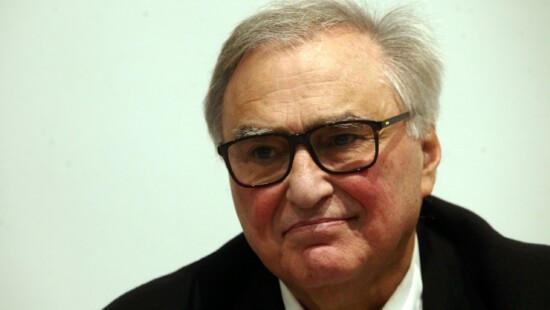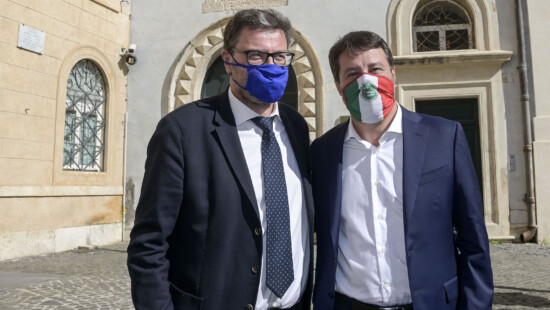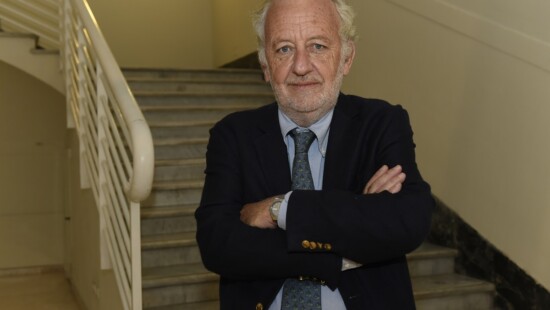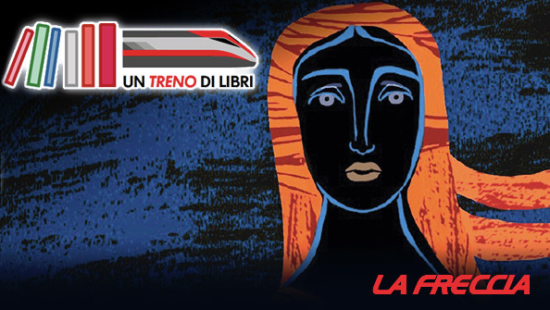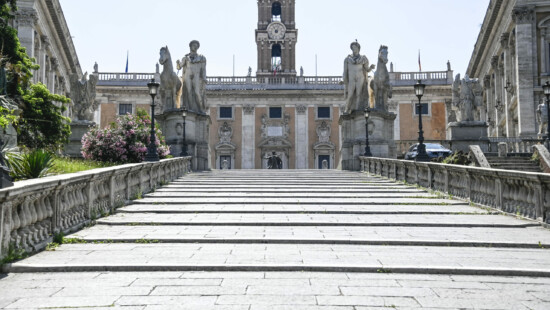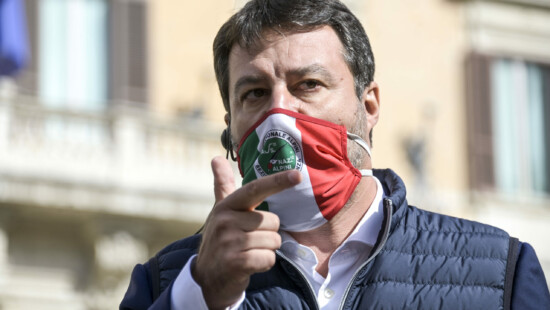Firmato nuovo Dpcm: stop alle gite scolastiche e divieto di feste nei locali [embedyt] https://www.youtube.com/watch?v=wjwQyzDaoW0[/embedyt] Roma, 13 ott. (askanews) - Stop alle gite scolastiche, stop alla movida e agli sport di contatto amatoriali, stop alle feste private. Con una "forte raccomandazione" per le cene a casa con un massimo di 6 persone. Firmato nella notte il nuovo Dpcm, dopo un…
Archivi
A un Miglio dall'Ue. Il prof. Sapelli legge la Lega e il piano di Giorgetti
Altro che rivoluzione liberale. “Alla Lega serve un nuovo Gianfranco Miglio. Gente che pensa, studia, elabora un pensiero”. Giulio Sapelli è un fiume in piena. Economista e storico della Statale di Milano, intellettuale di rango, poliedrico, piemontese doc, due anni fa è stato chiamato da Matteo Salvini per fare il premier prima che venisse scomodato un certo Giuseppe Conte. Poi…
Cosa sarà dell'Europa dopo la bufera Covid. La riflessione di Malgieri
Il coronavirus sta piegando l’Europa. Con una violenza assassina ha messo in ginocchio intere nazioni, mietendo vittime come in una vera e propria guerra. Milioni di contagiati si domandano quale sarà il loro destino superata la malattia. Ma, come è ovvio che sia per chi lotta per la vita e per scongiurare danni purtroppo in taluni casi irreparabili, non si…
Così difendiamo Colombo (in Parlamento). Scrive Nissoli Fitzgerald
Il secondo lunedì di ottobre, ogni anno, negli Stati Uniti si celebra il Columbus Day, la festa che esprime l’orgoglio degli italiani d’America incarnato dalla figura di Cristoforo Colombo. Ogni anno abbiamo celebrato il Columbus Day a New York, con la celebre parata, ma anche in ogni Stato americano, come festa di tutta l’America a testimonianza del contributo dato dagli…
Il ritorno in Europa della Lega. Ocone racconta la fine di un equivoco
Se si trattasse di un film e quello di stamattina fosse l’ultimo sketch, come regista non avrei dubbi su come intitolarlo: La fine di un equivoco. Perché sì, l’incontro a Roma di Matteo Salvini e Giancarlo Giorgetti, rispettivamente segretario e responsabile esteri della Lega, con gli europarlamentari del partito, ha messo alcuni puntini sulle i che erano forse evidenti solo…
Campidoglio e Palazzo Marino. Tutte le spine della maggioranza secondo Franchi
Niente schema Liguria per le amministrative di Pd e M5s, dice a Formiche.net il giornalista Paolo Franchi, editorialista del Corriere della Sera. Il riferimento è ad evitare soluzioni-tampone (come Sansa, ndr), preferendo una strategia di insieme che ad esempio rifletta sull'appeal del candidato al secondo turno. Franchi mette l'accento anche sulle contraddizioni interne al M5S (“a rischio implosione”) e su…
Il libro del mese di Ottobre: "Il bambino nascosto" di Roberto Andò
Sono due le voci di questo romanzo, due voci alte, risonanti e commoventi allo stesso tempo, ma ugualmente innocenti. Una è quella di Gabriele Santoro, un maestro di pianoforte, colto e un po’ misogino, che vive da solo nel quartiere malfamato di Forcella a Napoli; l’altra è di Ciro, un ragazzino di dieci anni, figlio di Carmine, uno degli scagnozzi…
Calenda, il Recovery Plan e le primarie a Roma. Lo spillo di Tobia Zevi
Che cosa c’entrano Carlo Calenda, il Recovery Plan e le primarie per Roma? Andiamo con ordine. Come tutti sanno, nelle prossime ore Calenda dovrebbe sciogliere la sua riserva e decidere se candidarsi a Roma. Si moltiplicano gli endorsement e nello stesso tempo gli appelli a partecipare alle primarie del centrosinistra, non ancora convocate ma probabili. Ma Calenda non sembra disposto…
La pandemia scopre le carte dei cartomanti
La pandemia, il Killer; l’Istat, imperterrita, il pandemonio lo indaga, stilando i dati: per le famiglie diminuisce il reddito e cresce la propensione al risparmio. Fosca a dir poco appare la fotografia dell’economia italiana scattata nel trimestre del pandemonio. Nel periodo compreso fra aprile e giugno 2020, infatti, il reddito disponibile delle famiglie risulta diminuito del 5,8% rispetto al trimestre…
Slegati. Così Salvini e Giorgetti salutano i sovranisti
La svolta c’è ma non si dice. Anzi sì, ma si sussurra, fra le righe. La Lega cambia pelle all’Unione europea e guarda al di là del muretto sovranista. La riunione del leader Matteo Salvini e il vicesegretario, nonché responsabile Esteri del partito, Giancarlo Giorgetti a piazza Minerva con tutta la squadra degli eurodeputati si conclude con una presa d’atto…





